Comprehensive Principles of Taxation Assignment Solution
VerifiedAdded on 2023/06/10
|9
|1913
|54
Homework Assignment
AI Summary
This assignment solution addresses key principles of taxation, focusing on capital gains tax (CGT), business income, and various tax implications related to property. It analyzes scenarios involving property inheritance, rental income, property renovation, and property sales, providing detailed explanations of relevant tax provisions. The solution explores CGT events, the definition of business, and the characterization of business income. It also examines specific deductions related to rental properties, including borrowing costs, repairs, and maintenance. The assignment further covers issues such as doubtful debts, traveling expenses, and subscription fees, offering insights into Australian tax laws and their application in different financial situations. The solution provides a comprehensive overview of tax principles and their practical application in business and personal finance contexts.
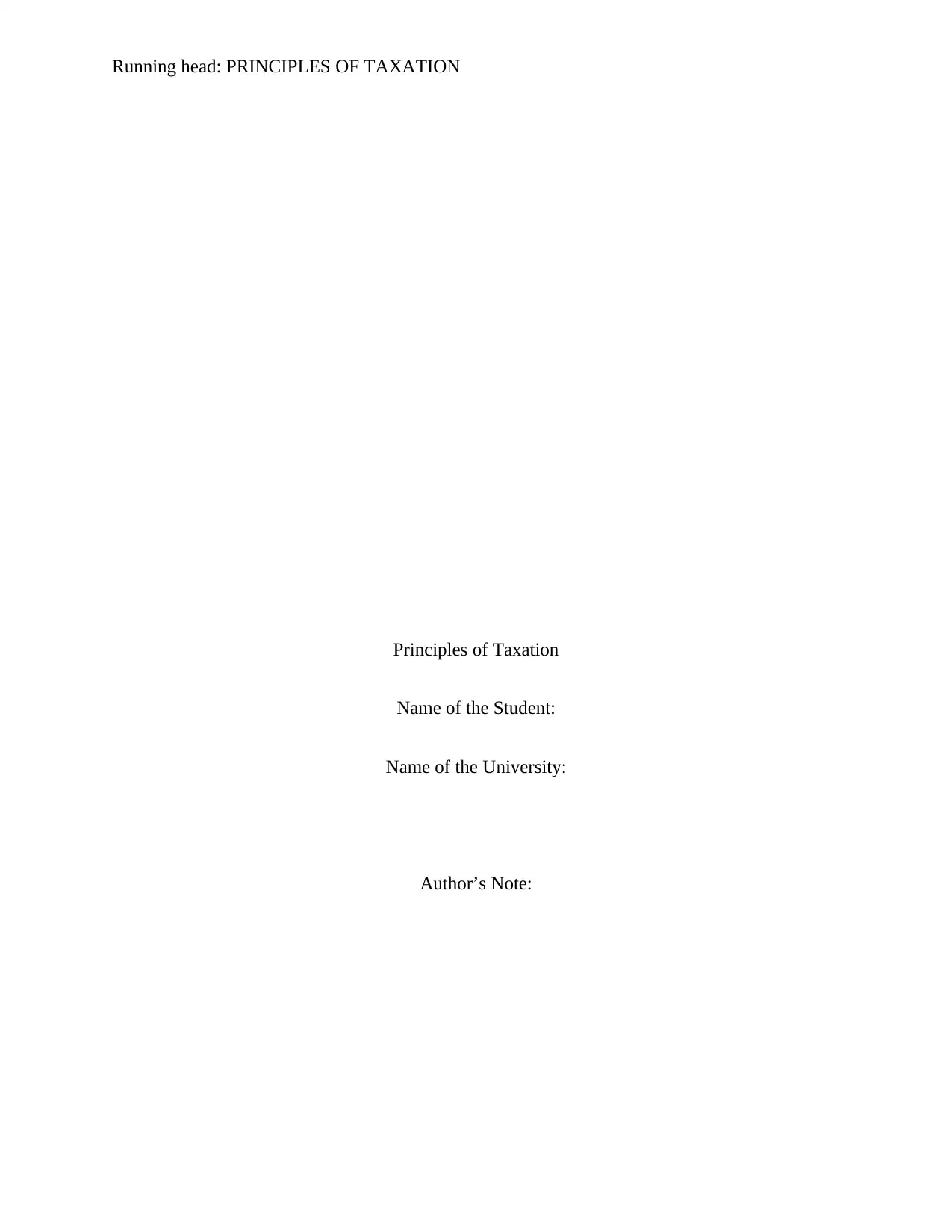
Running head: PRINCIPLES OF TAXATION
Principles of Taxation
Name of the Student:
Name of the University:
Author’s Note:
Principles of Taxation
Name of the Student:
Name of the University:
Author’s Note:
Paraphrase This Document
Need a fresh take? Get an instant paraphrase of this document with our AI Paraphraser
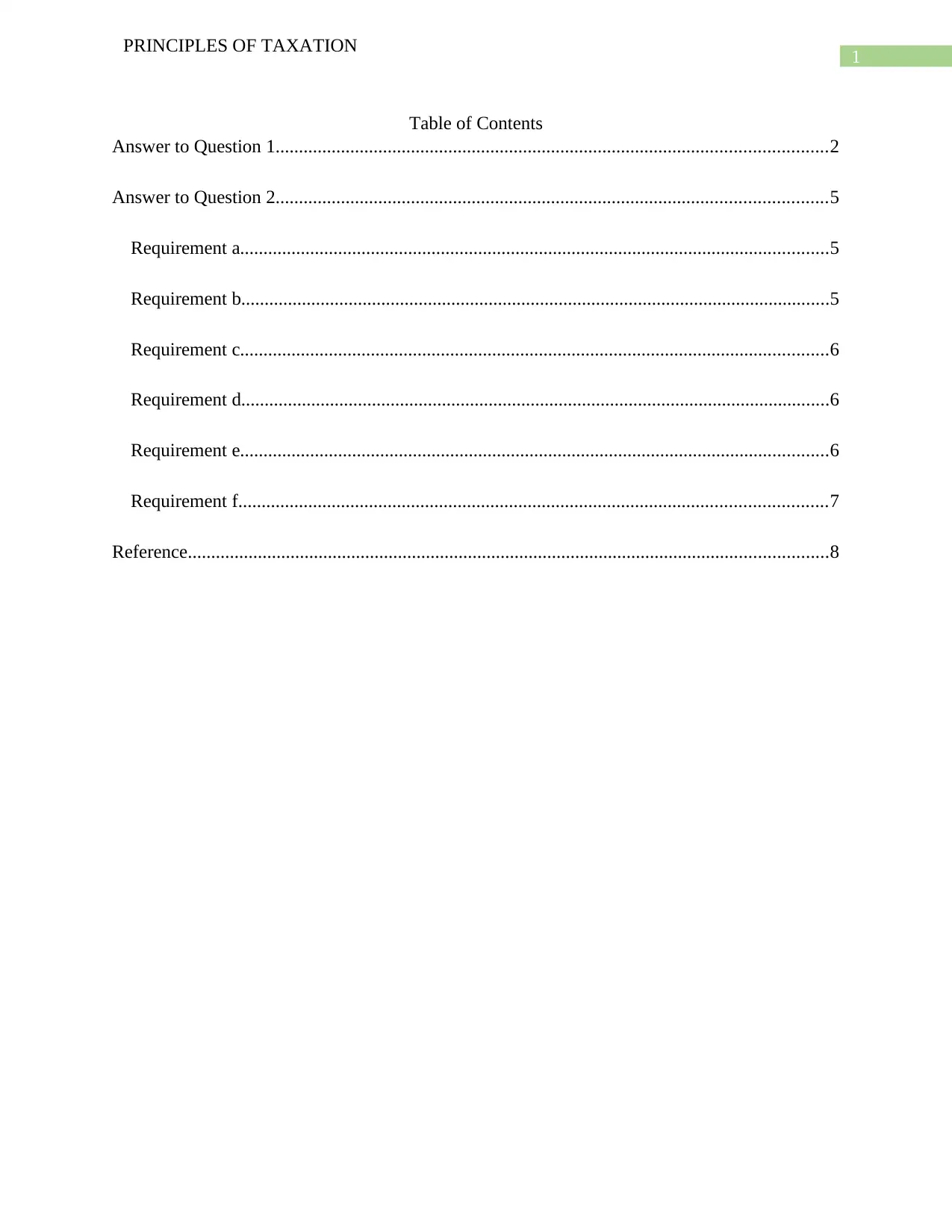
1
PRINCIPLES OF TAXATION
Table of Contents
Answer to Question 1......................................................................................................................2
Answer to Question 2......................................................................................................................5
Requirement a..............................................................................................................................5
Requirement b..............................................................................................................................5
Requirement c..............................................................................................................................6
Requirement d..............................................................................................................................6
Requirement e..............................................................................................................................6
Requirement f..............................................................................................................................7
Reference.........................................................................................................................................8
PRINCIPLES OF TAXATION
Table of Contents
Answer to Question 1......................................................................................................................2
Answer to Question 2......................................................................................................................5
Requirement a..............................................................................................................................5
Requirement b..............................................................................................................................5
Requirement c..............................................................................................................................6
Requirement d..............................................................................................................................6
Requirement e..............................................................................................................................6
Requirement f..............................................................................................................................7
Reference.........................................................................................................................................8
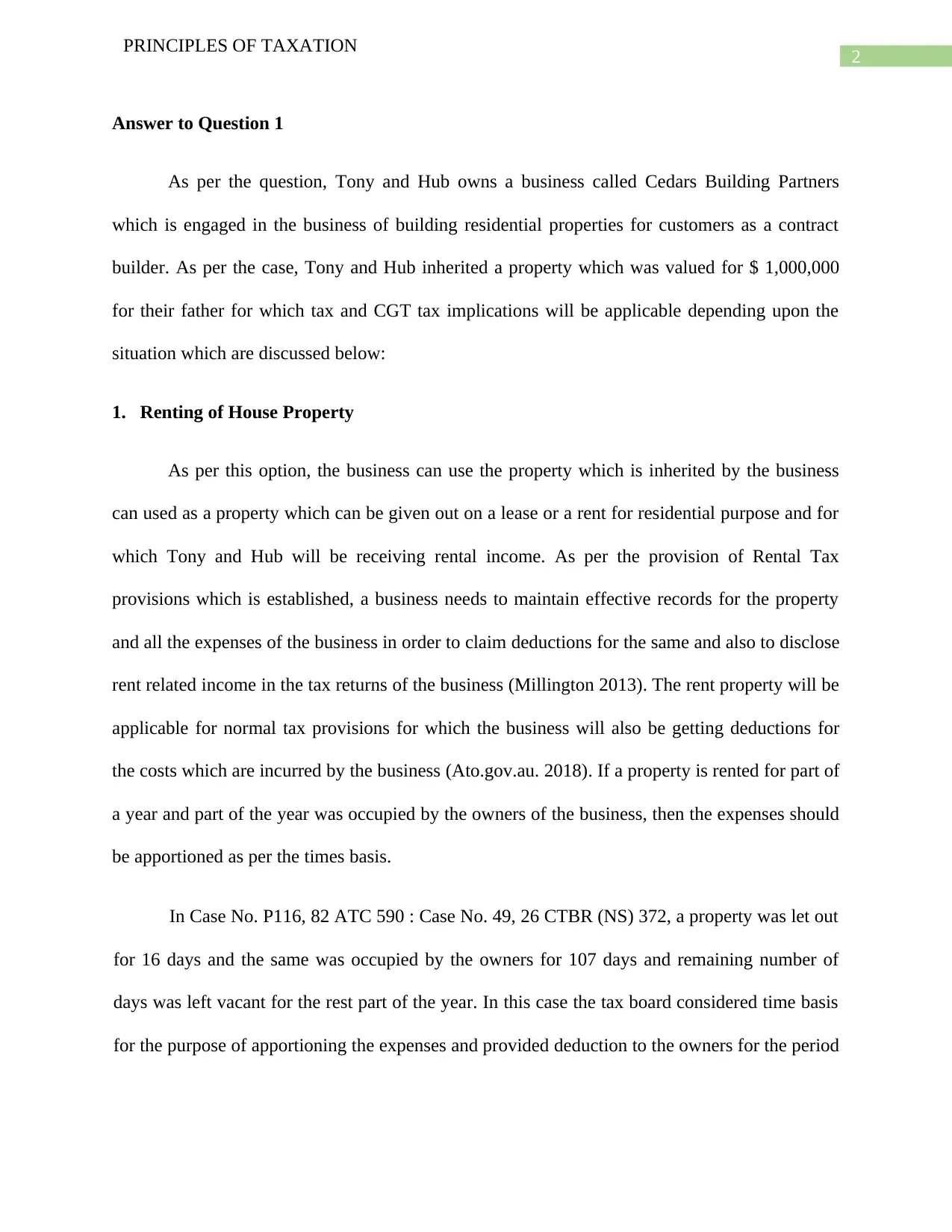
2
PRINCIPLES OF TAXATION
Answer to Question 1
As per the question, Tony and Hub owns a business called Cedars Building Partners
which is engaged in the business of building residential properties for customers as a contract
builder. As per the case, Tony and Hub inherited a property which was valued for $ 1,000,000
for their father for which tax and CGT tax implications will be applicable depending upon the
situation which are discussed below:
1. Renting of House Property
As per this option, the business can use the property which is inherited by the business
can used as a property which can be given out on a lease or a rent for residential purpose and for
which Tony and Hub will be receiving rental income. As per the provision of Rental Tax
provisions which is established, a business needs to maintain effective records for the property
and all the expenses of the business in order to claim deductions for the same and also to disclose
rent related income in the tax returns of the business (Millington 2013). The rent property will be
applicable for normal tax provisions for which the business will also be getting deductions for
the costs which are incurred by the business (Ato.gov.au. 2018). If a property is rented for part of
a year and part of the year was occupied by the owners of the business, then the expenses should
be apportioned as per the times basis.
In Case No. P116, 82 ATC 590 : Case No. 49, 26 CTBR (NS) 372, a property was let out
for 16 days and the same was occupied by the owners for 107 days and remaining number of
days was left vacant for the rest part of the year. In this case the tax board considered time basis
for the purpose of apportioning the expenses and provided deduction to the owners for the period
PRINCIPLES OF TAXATION
Answer to Question 1
As per the question, Tony and Hub owns a business called Cedars Building Partners
which is engaged in the business of building residential properties for customers as a contract
builder. As per the case, Tony and Hub inherited a property which was valued for $ 1,000,000
for their father for which tax and CGT tax implications will be applicable depending upon the
situation which are discussed below:
1. Renting of House Property
As per this option, the business can use the property which is inherited by the business
can used as a property which can be given out on a lease or a rent for residential purpose and for
which Tony and Hub will be receiving rental income. As per the provision of Rental Tax
provisions which is established, a business needs to maintain effective records for the property
and all the expenses of the business in order to claim deductions for the same and also to disclose
rent related income in the tax returns of the business (Millington 2013). The rent property will be
applicable for normal tax provisions for which the business will also be getting deductions for
the costs which are incurred by the business (Ato.gov.au. 2018). If a property is rented for part of
a year and part of the year was occupied by the owners of the business, then the expenses should
be apportioned as per the times basis.
In Case No. P116, 82 ATC 590 : Case No. 49, 26 CTBR (NS) 372, a property was let out
for 16 days and the same was occupied by the owners for 107 days and remaining number of
days was left vacant for the rest part of the year. In this case the tax board considered time basis
for the purpose of apportioning the expenses and provided deduction to the owners for the period
⊘ This is a preview!⊘
Do you want full access?
Subscribe today to unlock all pages.

Trusted by 1+ million students worldwide
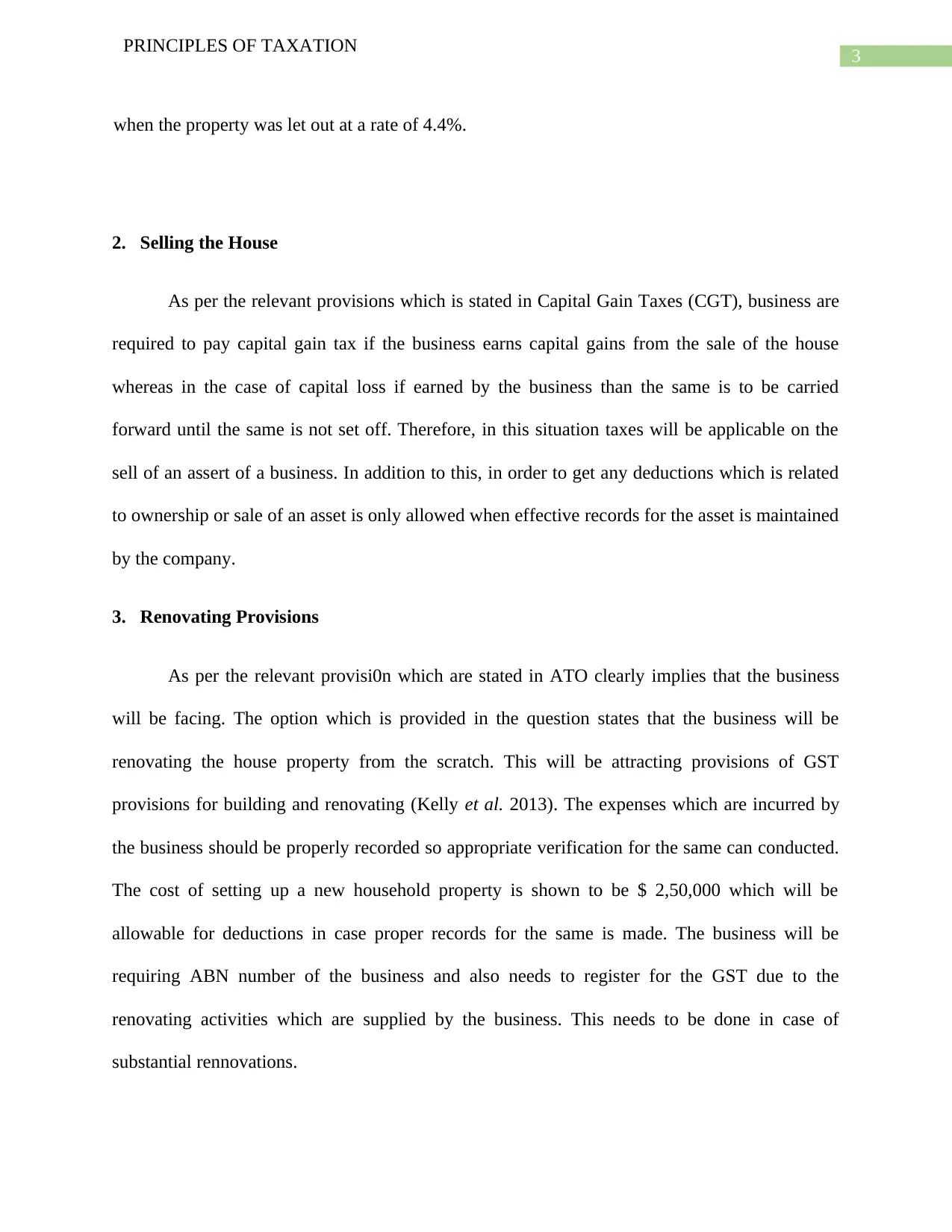
3
PRINCIPLES OF TAXATION
when the property was let out at a rate of 4.4%.
2. Selling the House
As per the relevant provisions which is stated in Capital Gain Taxes (CGT), business are
required to pay capital gain tax if the business earns capital gains from the sale of the house
whereas in the case of capital loss if earned by the business than the same is to be carried
forward until the same is not set off. Therefore, in this situation taxes will be applicable on the
sell of an assert of a business. In addition to this, in order to get any deductions which is related
to ownership or sale of an asset is only allowed when effective records for the asset is maintained
by the company.
3. Renovating Provisions
As per the relevant provisi0n which are stated in ATO clearly implies that the business
will be facing. The option which is provided in the question states that the business will be
renovating the house property from the scratch. This will be attracting provisions of GST
provisions for building and renovating (Kelly et al. 2013). The expenses which are incurred by
the business should be properly recorded so appropriate verification for the same can conducted.
The cost of setting up a new household property is shown to be $ 2,50,000 which will be
allowable for deductions in case proper records for the same is made. The business will be
requiring ABN number of the business and also needs to register for the GST due to the
renovating activities which are supplied by the business. This needs to be done in case of
substantial rennovations.
PRINCIPLES OF TAXATION
when the property was let out at a rate of 4.4%.
2. Selling the House
As per the relevant provisions which is stated in Capital Gain Taxes (CGT), business are
required to pay capital gain tax if the business earns capital gains from the sale of the house
whereas in the case of capital loss if earned by the business than the same is to be carried
forward until the same is not set off. Therefore, in this situation taxes will be applicable on the
sell of an assert of a business. In addition to this, in order to get any deductions which is related
to ownership or sale of an asset is only allowed when effective records for the asset is maintained
by the company.
3. Renovating Provisions
As per the relevant provisi0n which are stated in ATO clearly implies that the business
will be facing. The option which is provided in the question states that the business will be
renovating the house property from the scratch. This will be attracting provisions of GST
provisions for building and renovating (Kelly et al. 2013). The expenses which are incurred by
the business should be properly recorded so appropriate verification for the same can conducted.
The cost of setting up a new household property is shown to be $ 2,50,000 which will be
allowable for deductions in case proper records for the same is made. The business will be
requiring ABN number of the business and also needs to register for the GST due to the
renovating activities which are supplied by the business. This needs to be done in case of
substantial rennovations.
Paraphrase This Document
Need a fresh take? Get an instant paraphrase of this document with our AI Paraphraser
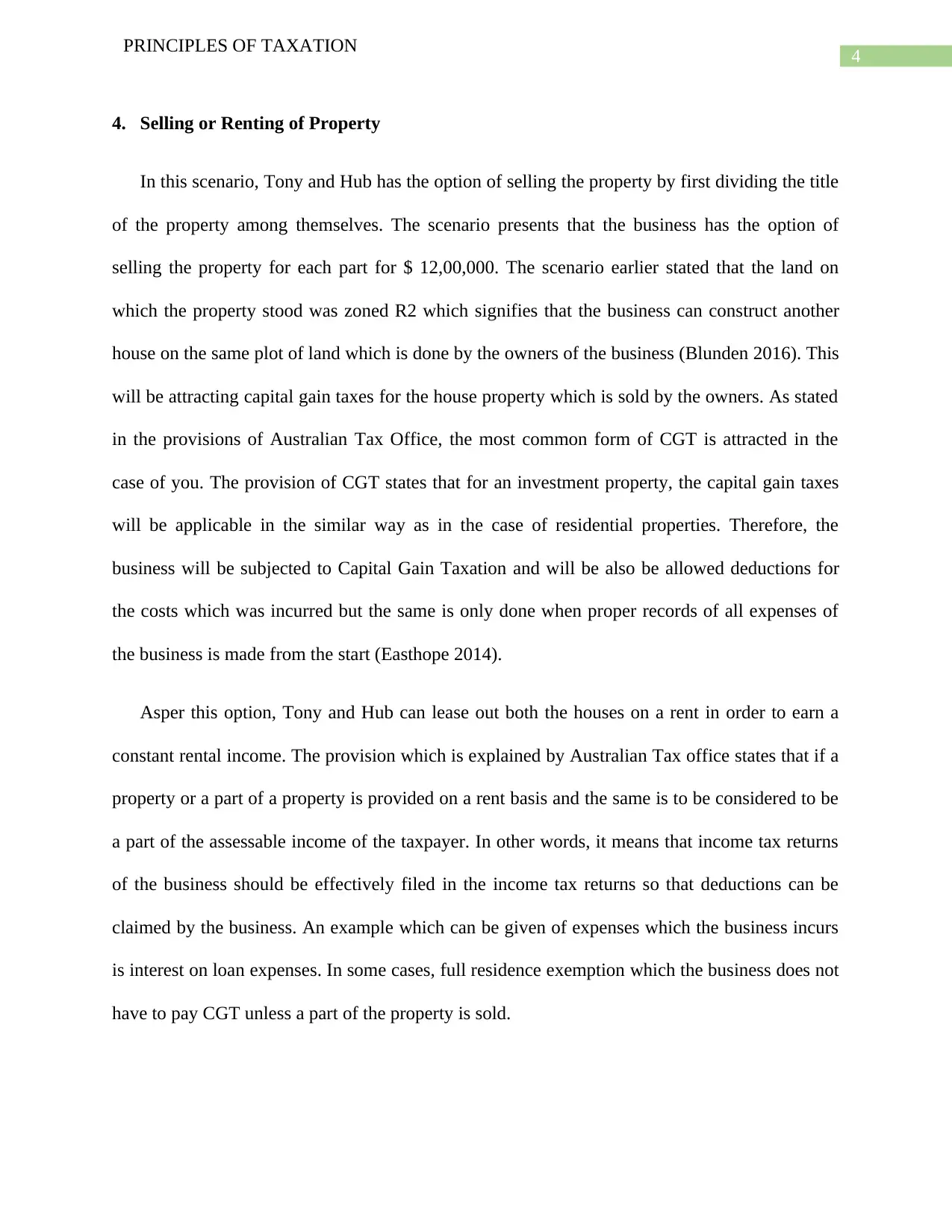
4
PRINCIPLES OF TAXATION
4. Selling or Renting of Property
In this scenario, Tony and Hub has the option of selling the property by first dividing the title
of the property among themselves. The scenario presents that the business has the option of
selling the property for each part for $ 12,00,000. The scenario earlier stated that the land on
which the property stood was zoned R2 which signifies that the business can construct another
house on the same plot of land which is done by the owners of the business (Blunden 2016). This
will be attracting capital gain taxes for the house property which is sold by the owners. As stated
in the provisions of Australian Tax Office, the most common form of CGT is attracted in the
case of you. The provision of CGT states that for an investment property, the capital gain taxes
will be applicable in the similar way as in the case of residential properties. Therefore, the
business will be subjected to Capital Gain Taxation and will be also be allowed deductions for
the costs which was incurred but the same is only done when proper records of all expenses of
the business is made from the start (Easthope 2014).
Asper this option, Tony and Hub can lease out both the houses on a rent in order to earn a
constant rental income. The provision which is explained by Australian Tax office states that if a
property or a part of a property is provided on a rent basis and the same is to be considered to be
a part of the assessable income of the taxpayer. In other words, it means that income tax returns
of the business should be effectively filed in the income tax returns so that deductions can be
claimed by the business. An example which can be given of expenses which the business incurs
is interest on loan expenses. In some cases, full residence exemption which the business does not
have to pay CGT unless a part of the property is sold.
PRINCIPLES OF TAXATION
4. Selling or Renting of Property
In this scenario, Tony and Hub has the option of selling the property by first dividing the title
of the property among themselves. The scenario presents that the business has the option of
selling the property for each part for $ 12,00,000. The scenario earlier stated that the land on
which the property stood was zoned R2 which signifies that the business can construct another
house on the same plot of land which is done by the owners of the business (Blunden 2016). This
will be attracting capital gain taxes for the house property which is sold by the owners. As stated
in the provisions of Australian Tax Office, the most common form of CGT is attracted in the
case of you. The provision of CGT states that for an investment property, the capital gain taxes
will be applicable in the similar way as in the case of residential properties. Therefore, the
business will be subjected to Capital Gain Taxation and will be also be allowed deductions for
the costs which was incurred but the same is only done when proper records of all expenses of
the business is made from the start (Easthope 2014).
Asper this option, Tony and Hub can lease out both the houses on a rent in order to earn a
constant rental income. The provision which is explained by Australian Tax office states that if a
property or a part of a property is provided on a rent basis and the same is to be considered to be
a part of the assessable income of the taxpayer. In other words, it means that income tax returns
of the business should be effectively filed in the income tax returns so that deductions can be
claimed by the business. An example which can be given of expenses which the business incurs
is interest on loan expenses. In some cases, full residence exemption which the business does not
have to pay CGT unless a part of the property is sold.
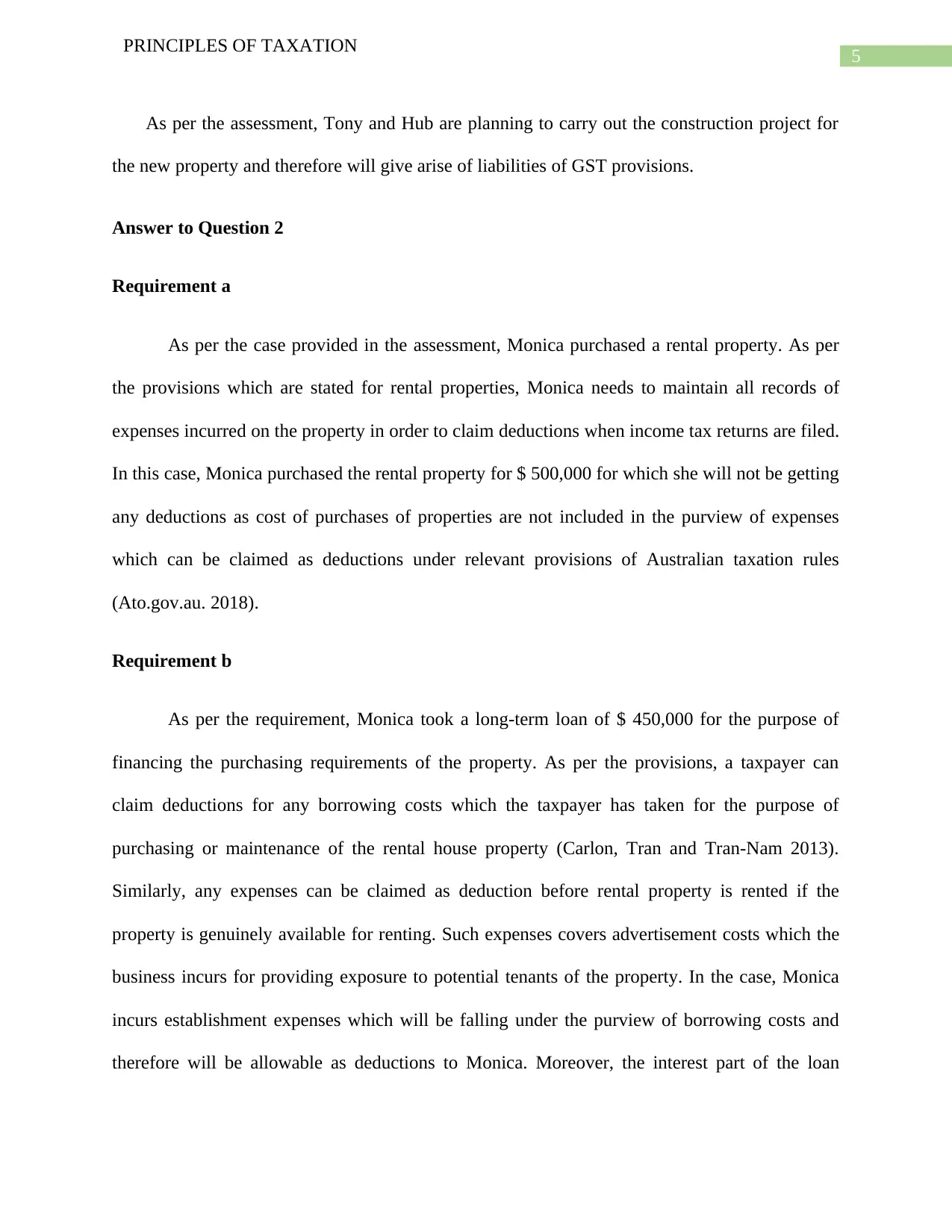
5
PRINCIPLES OF TAXATION
As per the assessment, Tony and Hub are planning to carry out the construction project for
the new property and therefore will give arise of liabilities of GST provisions.
Answer to Question 2
Requirement a
As per the case provided in the assessment, Monica purchased a rental property. As per
the provisions which are stated for rental properties, Monica needs to maintain all records of
expenses incurred on the property in order to claim deductions when income tax returns are filed.
In this case, Monica purchased the rental property for $ 500,000 for which she will not be getting
any deductions as cost of purchases of properties are not included in the purview of expenses
which can be claimed as deductions under relevant provisions of Australian taxation rules
(Ato.gov.au. 2018).
Requirement b
As per the requirement, Monica took a long-term loan of $ 450,000 for the purpose of
financing the purchasing requirements of the property. As per the provisions, a taxpayer can
claim deductions for any borrowing costs which the taxpayer has taken for the purpose of
purchasing or maintenance of the rental house property (Carlon, Tran and Tran-Nam 2013).
Similarly, any expenses can be claimed as deduction before rental property is rented if the
property is genuinely available for renting. Such expenses covers advertisement costs which the
business incurs for providing exposure to potential tenants of the property. In the case, Monica
incurs establishment expenses which will be falling under the purview of borrowing costs and
therefore will be allowable as deductions to Monica. Moreover, the interest part of the loan
PRINCIPLES OF TAXATION
As per the assessment, Tony and Hub are planning to carry out the construction project for
the new property and therefore will give arise of liabilities of GST provisions.
Answer to Question 2
Requirement a
As per the case provided in the assessment, Monica purchased a rental property. As per
the provisions which are stated for rental properties, Monica needs to maintain all records of
expenses incurred on the property in order to claim deductions when income tax returns are filed.
In this case, Monica purchased the rental property for $ 500,000 for which she will not be getting
any deductions as cost of purchases of properties are not included in the purview of expenses
which can be claimed as deductions under relevant provisions of Australian taxation rules
(Ato.gov.au. 2018).
Requirement b
As per the requirement, Monica took a long-term loan of $ 450,000 for the purpose of
financing the purchasing requirements of the property. As per the provisions, a taxpayer can
claim deductions for any borrowing costs which the taxpayer has taken for the purpose of
purchasing or maintenance of the rental house property (Carlon, Tran and Tran-Nam 2013).
Similarly, any expenses can be claimed as deduction before rental property is rented if the
property is genuinely available for renting. Such expenses covers advertisement costs which the
business incurs for providing exposure to potential tenants of the property. In the case, Monica
incurs establishment expenses which will be falling under the purview of borrowing costs and
therefore will be allowable as deductions to Monica. Moreover, the interest part of the loan
⊘ This is a preview!⊘
Do you want full access?
Subscribe today to unlock all pages.

Trusted by 1+ million students worldwide
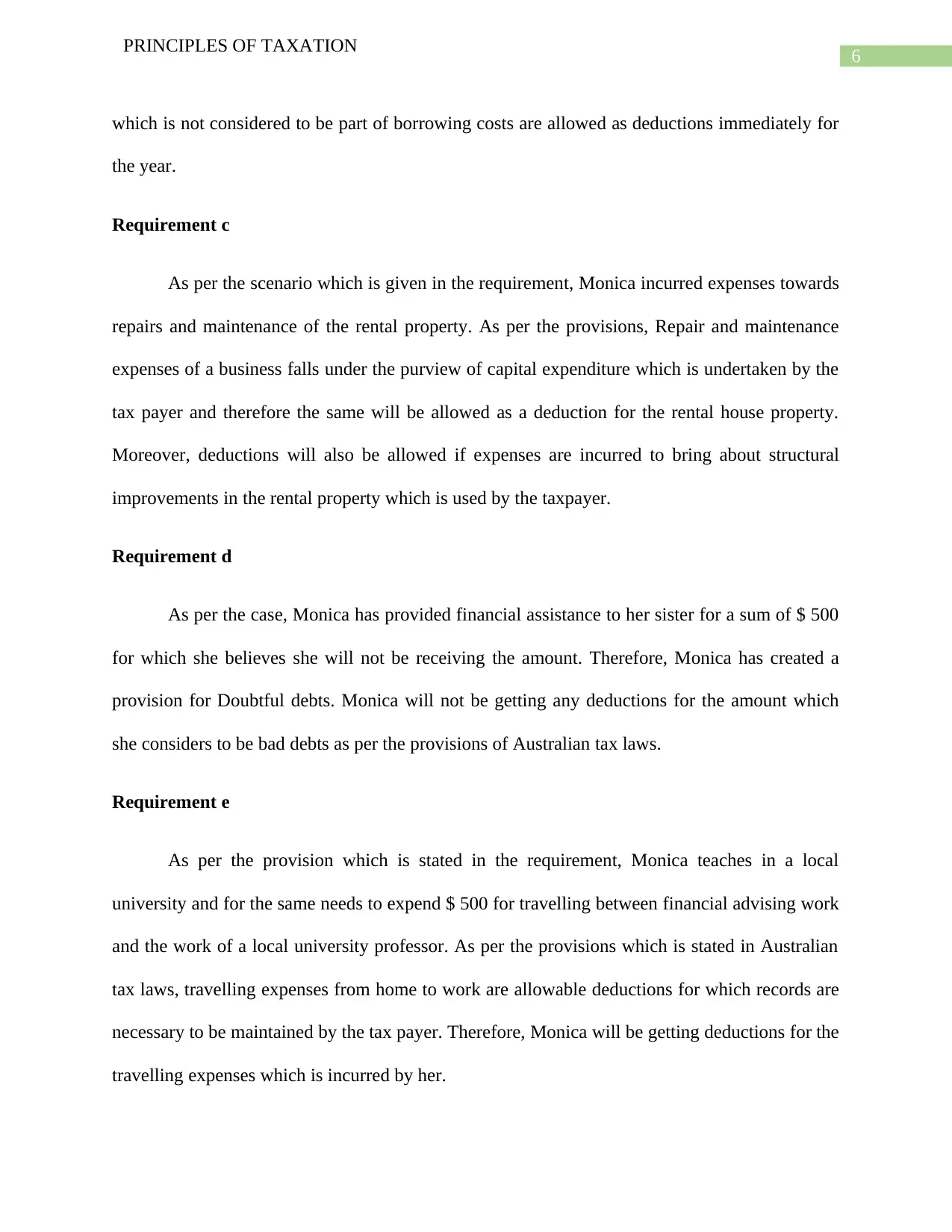
6
PRINCIPLES OF TAXATION
which is not considered to be part of borrowing costs are allowed as deductions immediately for
the year.
Requirement c
As per the scenario which is given in the requirement, Monica incurred expenses towards
repairs and maintenance of the rental property. As per the provisions, Repair and maintenance
expenses of a business falls under the purview of capital expenditure which is undertaken by the
tax payer and therefore the same will be allowed as a deduction for the rental house property.
Moreover, deductions will also be allowed if expenses are incurred to bring about structural
improvements in the rental property which is used by the taxpayer.
Requirement d
As per the case, Monica has provided financial assistance to her sister for a sum of $ 500
for which she believes she will not be receiving the amount. Therefore, Monica has created a
provision for Doubtful debts. Monica will not be getting any deductions for the amount which
she considers to be bad debts as per the provisions of Australian tax laws.
Requirement e
As per the provision which is stated in the requirement, Monica teaches in a local
university and for the same needs to expend $ 500 for travelling between financial advising work
and the work of a local university professor. As per the provisions which is stated in Australian
tax laws, travelling expenses from home to work are allowable deductions for which records are
necessary to be maintained by the tax payer. Therefore, Monica will be getting deductions for the
travelling expenses which is incurred by her.
PRINCIPLES OF TAXATION
which is not considered to be part of borrowing costs are allowed as deductions immediately for
the year.
Requirement c
As per the scenario which is given in the requirement, Monica incurred expenses towards
repairs and maintenance of the rental property. As per the provisions, Repair and maintenance
expenses of a business falls under the purview of capital expenditure which is undertaken by the
tax payer and therefore the same will be allowed as a deduction for the rental house property.
Moreover, deductions will also be allowed if expenses are incurred to bring about structural
improvements in the rental property which is used by the taxpayer.
Requirement d
As per the case, Monica has provided financial assistance to her sister for a sum of $ 500
for which she believes she will not be receiving the amount. Therefore, Monica has created a
provision for Doubtful debts. Monica will not be getting any deductions for the amount which
she considers to be bad debts as per the provisions of Australian tax laws.
Requirement e
As per the provision which is stated in the requirement, Monica teaches in a local
university and for the same needs to expend $ 500 for travelling between financial advising work
and the work of a local university professor. As per the provisions which is stated in Australian
tax laws, travelling expenses from home to work are allowable deductions for which records are
necessary to be maintained by the tax payer. Therefore, Monica will be getting deductions for the
travelling expenses which is incurred by her.
Paraphrase This Document
Need a fresh take? Get an instant paraphrase of this document with our AI Paraphraser
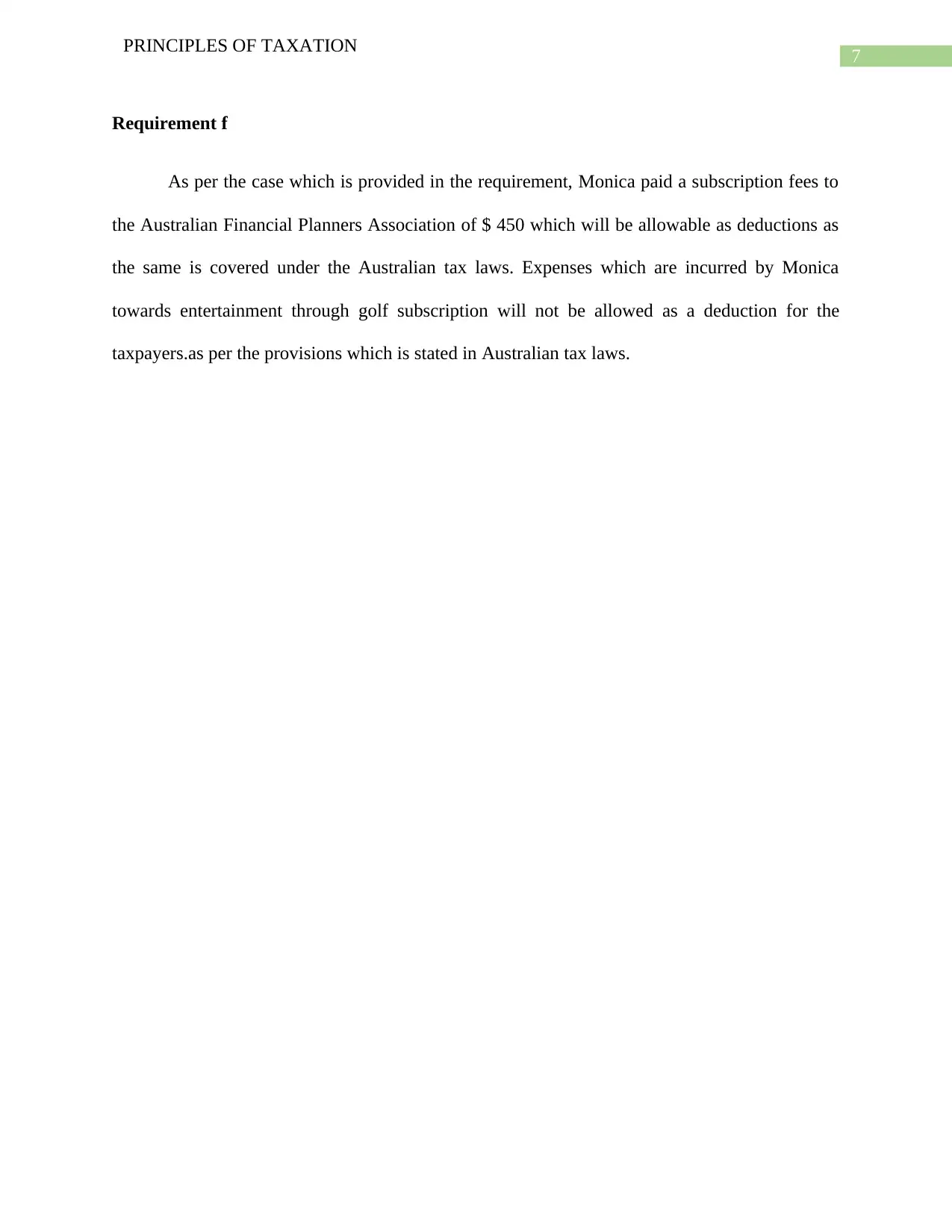
7
PRINCIPLES OF TAXATION
Requirement f
As per the case which is provided in the requirement, Monica paid a subscription fees to
the Australian Financial Planners Association of $ 450 which will be allowable as deductions as
the same is covered under the Australian tax laws. Expenses which are incurred by Monica
towards entertainment through golf subscription will not be allowed as a deduction for the
taxpayers.as per the provisions which is stated in Australian tax laws.
PRINCIPLES OF TAXATION
Requirement f
As per the case which is provided in the requirement, Monica paid a subscription fees to
the Australian Financial Planners Association of $ 450 which will be allowable as deductions as
the same is covered under the Australian tax laws. Expenses which are incurred by Monica
towards entertainment through golf subscription will not be allowed as a deduction for the
taxpayers.as per the provisions which is stated in Australian tax laws.
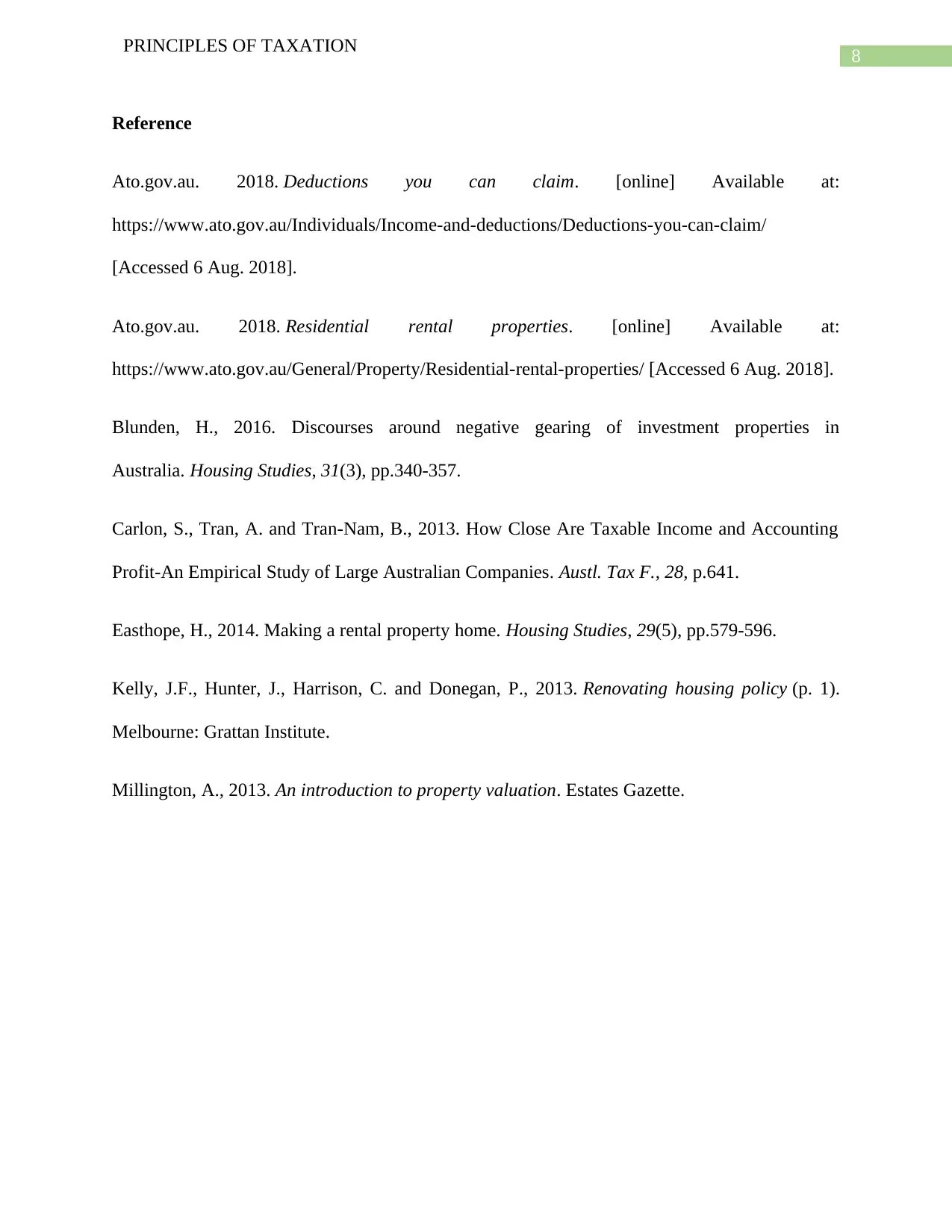
8
PRINCIPLES OF TAXATION
Reference
Ato.gov.au. 2018. Deductions you can claim. [online] Available at:
https://www.ato.gov.au/Individuals/Income-and-deductions/Deductions-you-can-claim/
[Accessed 6 Aug. 2018].
Ato.gov.au. 2018. Residential rental properties. [online] Available at:
https://www.ato.gov.au/General/Property/Residential-rental-properties/ [Accessed 6 Aug. 2018].
Blunden, H., 2016. Discourses around negative gearing of investment properties in
Australia. Housing Studies, 31(3), pp.340-357.
Carlon, S., Tran, A. and Tran-Nam, B., 2013. How Close Are Taxable Income and Accounting
Profit-An Empirical Study of Large Australian Companies. Austl. Tax F., 28, p.641.
Easthope, H., 2014. Making a rental property home. Housing Studies, 29(5), pp.579-596.
Kelly, J.F., Hunter, J., Harrison, C. and Donegan, P., 2013. Renovating housing policy (p. 1).
Melbourne: Grattan Institute.
Millington, A., 2013. An introduction to property valuation. Estates Gazette.
PRINCIPLES OF TAXATION
Reference
Ato.gov.au. 2018. Deductions you can claim. [online] Available at:
https://www.ato.gov.au/Individuals/Income-and-deductions/Deductions-you-can-claim/
[Accessed 6 Aug. 2018].
Ato.gov.au. 2018. Residential rental properties. [online] Available at:
https://www.ato.gov.au/General/Property/Residential-rental-properties/ [Accessed 6 Aug. 2018].
Blunden, H., 2016. Discourses around negative gearing of investment properties in
Australia. Housing Studies, 31(3), pp.340-357.
Carlon, S., Tran, A. and Tran-Nam, B., 2013. How Close Are Taxable Income and Accounting
Profit-An Empirical Study of Large Australian Companies. Austl. Tax F., 28, p.641.
Easthope, H., 2014. Making a rental property home. Housing Studies, 29(5), pp.579-596.
Kelly, J.F., Hunter, J., Harrison, C. and Donegan, P., 2013. Renovating housing policy (p. 1).
Melbourne: Grattan Institute.
Millington, A., 2013. An introduction to property valuation. Estates Gazette.
⊘ This is a preview!⊘
Do you want full access?
Subscribe today to unlock all pages.

Trusted by 1+ million students worldwide
1 out of 9
Related Documents
Your All-in-One AI-Powered Toolkit for Academic Success.
+13062052269
info@desklib.com
Available 24*7 on WhatsApp / Email
![[object Object]](/_next/static/media/star-bottom.7253800d.svg)
Unlock your academic potential
Copyright © 2020–2026 A2Z Services. All Rights Reserved. Developed and managed by ZUCOL.





